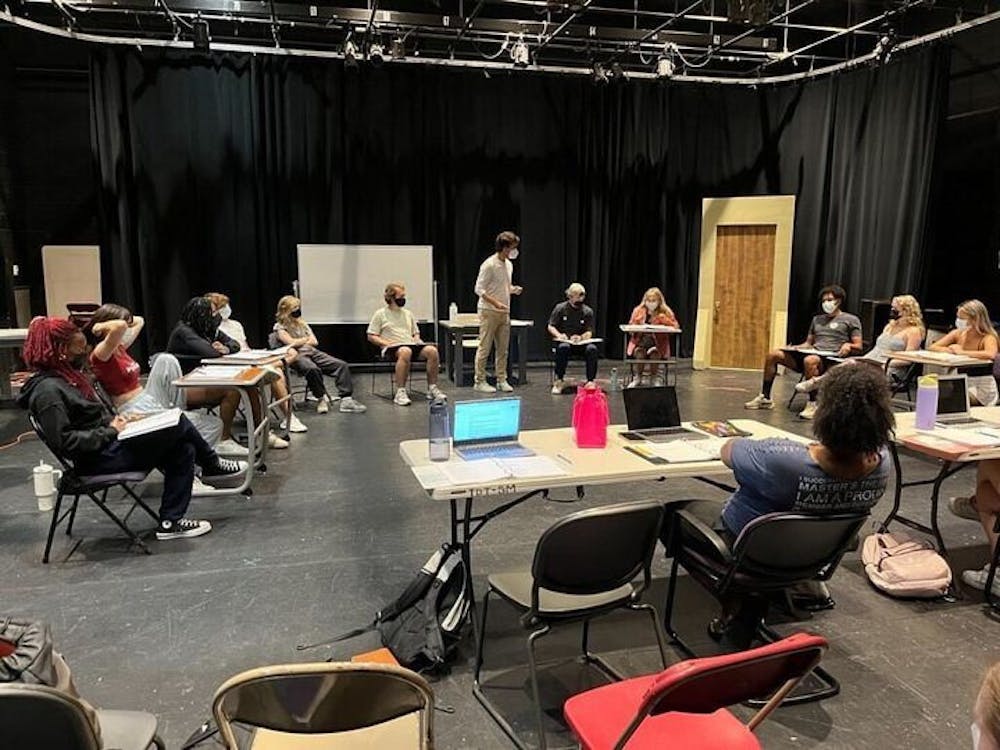Starting Oct. 6, Roberts Studio Theatre will transform into a high school English classroom — the setting of Elon University’s performing arts fall play, “John Proctor is the Villain.”
Set in the peak of the #MeToo movement, “John Proctor is the Villain” follows a group of high school students in rural Georgia reading “The Crucible” in their literature class.
“The Crucible” is a 1953 play by Arthur Miller about the Salem witch trials. John Proctor — one of the play’s main characters — is often viewed as the story’s hero, but Kimberly Belflower challenges this narrative with a play of her own, “John Proctor is the Villain.”
Since the play was published in 2019, before the COVID-19 pandemic, Elon’s production of “John Proctor is the Villain” will be the sixth production in the play’s history.
The Elon community will have six opportunities to see the show, with 7:30 p.m. performances Oct. 6, Oct. 7, Oct. 9 and Oct. 10; and 2 p.m. matinees on Oct. 7 and 8. Tickets can be reserved online and are $15 at the door or free with an Elon ID.
Senior Matthew Bobzien is the production’s dramaturg and said he read “The Crucible” for the first time while doing research for Elon’s production of Belflower’s play. Bobzien said they were one of the few students who hadn’t seen “The Crucible” before.
Senior Cara Johnson said they first saw a production of “The Crucible” in the spring while they were studying abroad in London. They said watching the play was a requirement for the program and Johnson said questioned John Proctor’s role as a “hero” from the start.
“Everybody talks about John Proctor. He's supposed to be this respectable man, but the only thing that I took away was that he slept with a 16-year-old girl when he was married and she was working for him and had just lost her parents,” Johnson said. “And so I was like ‘John Proctor is clearly the villain,’ but nobody talked about that. And so working on this show has honestly been really, really refreshing.”
Johnson said they were first introduced to “John Proctor is the Villain” a couple of years ago, during an Elon performing arts scene selection workshop.
“I think this is an example of how higher-ups at the school are taking student voices because the first time that this show was proposed was in a scene selection workshop from the students,” Johnson said. “It's a step towards transparency and more direct communication.”
In the show, Johnson plays Ms. Bailey Gallagher, the school counselor.
“It's really nice to be able to see young people, even if they are characters that have been written, fight for change that's going to help them and not just fall in directly to the lanes that were placed there for them because those end up being harmful sometimes,” Johnson said.
In the play, the plot points of “The Crucible” parallel what is happening in the students’ lives and community.
“There's also tension in the community and scandals in the community surrounding the #MeToo movement,” Bobzien said. “And so it's about how they sort of interrogate the crucible through a feminist lens and thinking about it in terms of what they're experiencing right now.”
As the dramaturg, Bobzien researched the show’s settings, themes and references to inform production decisions and help the audience feel more connected to the show. Bobzien said “John Proctor is the Villain” is filled with pop-culture references, often associated with the #MeToo movement.
Part of Bobzien’s role was researching these references and their context, including Taylor Swift, “Gilmore Girls,” Harry Styles, Selena Gomez and Serena Williams — who was not in the original script written in 2019.
“There's a line in the original script … where she, one of the characters, is talking about the body positivity movement and white feminism dominating it. And she says, ‘Thank God for Lizzo’ and we're like, ‘Well, we don't want to do that anymore,’” Bobzien said. “We reached out to the publishing company, got permission to change it to Serena Williams.”
Bobzien and Johnson agreed the play’s feminist messaging is what makes the show not only inspiring, but also motivational.
Johnson said their favorite line from the show is one their character says: “You don’t have to apologize for existing.”
“We we live in an age where the #MeToo movement’s still happening, the scandals that they're facing in the community in the play are still happening around the world,” Bobzien said. “It's important for us to not only be aware of that, but also we can see how they find their voice so that we can hopefully, potentially, find our voice.”


